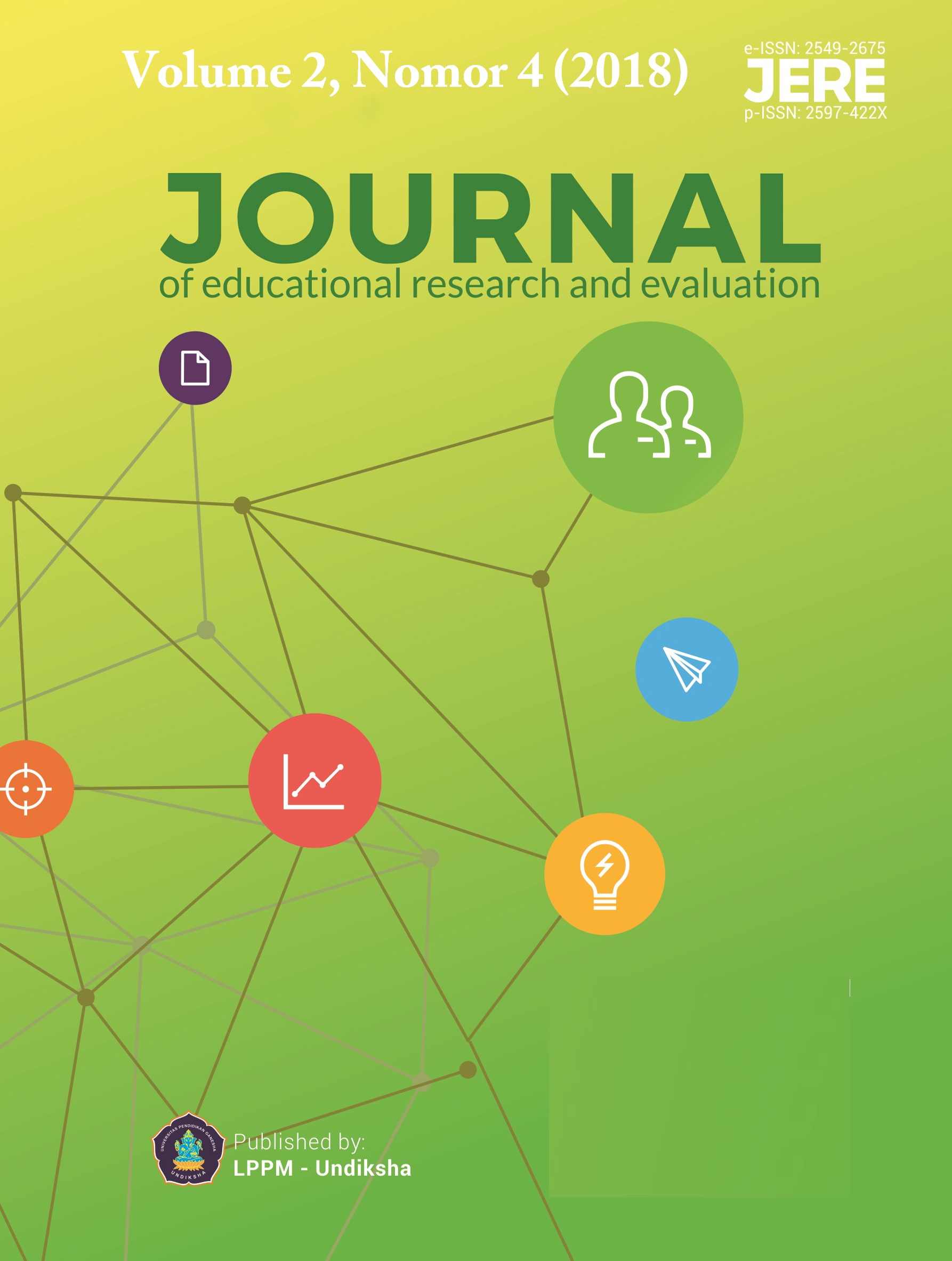APPLICATION OF HYPNOTEACHING METHOD TO IMPROVE SELF-CONFIDENCE AND RESULTS OF STUDENT MATHEMATIC LEARNING
DOI:
https://doi.org/10.23887/jere.v2i4.15699Keywords:
Hypnoteaching, hasil belajar, kepercayaan diri, PTK, bentuk aljabarAbstract
This research aims to improve student’s mathematics learning outcomes and their self-confidence using the Hypnoteaching method on the learning of Algebra for class VIII A of Islam Sultan Fattah Salatiga Junior High School. This research is included as classroom action research. The model used in this research is the Kemmis & Mc Taggart’s which consists of 4 stages namely planning, implementation, observation, and reflection. The improvement of student’s learning outcomes and self-confidence in learning mathematics are seen from their grades and self-confidence questionnaire scores. On one hand, 1st cycle of questionnaire results show that student’s had experienced improvement in self-confidence by 58% with the average of student’s learning outcomes by 58.4% and 42% completeness. On the other hand, the 2nd cycle of questionnaire results show that students had experienced improvement in self-confidence by 79% with the average of student’s learning outcomes by 76.9% and 79% completeness
References
As’ari, K. (2018). UPAYA MENINGKATKAN HASIL BELAJAR PENDIDIKAN AGAMA ISLAM (PAI) MENGGUNAKAN METODE HYPNOTEACHING BAGI SISWA KELAS VII C SMPN 1 LIMBANGAN KABUPATEN KENDAL TAHUN 2016/2017 As’ari, Kasan. Al-Fikri: Jurnal Studi Dan Penelitian Pendidikan Islam, Vol 1(No 1). https://doi.org/10.1074/jbc.M109.064931
Awalina, Nurul, DKK. 2016. Penerapan Model Visual Auditory Kinesthetic (VAK), dengan Teknik Hypnoteaching Untuk Meningkatkan Keterampilan Siswa Memerankan Tokoh Drama Di Kelas V SDN Tegalendah Kecamatan Rancakalong Kabupaten Sumedang. Jurnal Pena Ilmiah: Vol. 1, No. 1.
Braid, Lamp. (2015). The Adventages Hypnoteaching in Teaching. Retrieved on April, 12
De Vos, H. H. & Louw, D. A. (2008). Hypnosis-Induced Mental Training Programmes as A Strategy to Improv The Self-Concept of Student. Higher Educationn : the international journal of higher educaction planning, 57 (2): 141-154. Diperoleh dari https://eric.ed.gov/?id=EJ824893 pada tanggal 20 Juni 2018
Dimyati & Mudjiono. 2006. Belajar dan Pembelajaran. Jakarta: Rineka Cipta.
Dimyati dan Mudjiono. 2013. Belajar dan Pembelajaran. Cetakan kelima. Rineka Cipta: Jakarta.
Eline Yanty Putri Nasution, M. P. (2015). UPAYA MENINGKATKAN HASIL BELAJAR SISWA DENGAN MENGGUNAKAN TEKNIK PEMBELAJARAN HYPNOTEACHING Oleh: Eline Yanty Putri Nasution, M.Pd 1, 3, 78–95.
Hajar, Ibnu. 2011. Hypnoteaching Memaksimalkan Hasil Proses Belajar-mengajar dengan Hypnoterapi. Jogjakarta: Diva Press.
Hendriana, Heris. 2017. Hardskills dan Softskills matematik siswa. Bandung: Rifeka Aditama.
Kasmaja, Hadi. 2016. Efektivitas Implementasi Metode Hypnoteaching Untuk Meningkatkan Motivasi Dan Hasil Belajar Matematika Pada Siswa SMP Negeri. Journal of EST: Volume 2 Nomor 1 April 2016 hal. 33-45.
Muhibin Syah. 2008. Psikologi Pendidikan dengan Pendekatan Baru. Bandung: Remaja Rosdakarya
Navis, Ali Akbar. 2013. Hypnoteaching Revolusi Gaya Mengajar untuk Melejitkan Prestasi Siswa. Yogyakarta: Ar Ruzz Media.
Noer, Muhammad. 2010. Hypnoteaching for Success Learning. Yogyakarta: Pustaka Instan Mandani.
Prasmala, Erfitra Rezqi. 2014. Penerapan Model Reading Map Group Investigation (GI) untuk Meningkatkan Minat Baca, Kemampuan Berpikir Kritis, Kesadaran Metakognitif dan Hasil Belajar Biologi Siswa Kelas X SMA Surya Buana Malang. Tesis. Jurusan Pendidikan Biologi, Program Pascasarjana Universitas Negeri Malang.
Permendiknas Nomor 21 Tahun 2006
Permendiknas Nomor 21 Tahun 2016
Permendiknas Nomor 22 Tahun 2016
Rabawanti, Reika Widya (2017) Analisis Penggunaan Metode Hypnoteaching Dalam Kegiatan Ekstrakurikuler Seni Tari Remo Di SDN Dampit 01 Kabupaten Malang Tahun Ajaran 2016/2017. Thesis, University of Muhammadiyah Malang.
Rahmawatiningrum, Linta. (2012). Efektivitas Penggunaan Metode Hypnoteaching dalam Pembelajaran Matematika Kelas IV Semester II di SDIP H. Soebandi Kecamatan Bawen Kabupaten Semarang Tahun Pelajaran 2011/2012. Diakses pada Respository UKSW, http://repository.uksw.edu/handle/123456789/845
Sudjana, Nana. 2005. Penilaian Hasil Belajar Mengajar. Bandung: PT Remaja Rosdakarya Offset.
Yustitia, N. 2014. Hypnoteaching. Jogjakarta: Ar-Ruzz Media.
Downloads
Published
How to Cite
Issue
Section
License
Authors who publish with the Journal of Evaluation and Research in Education (JERE) agree to the following terms:
- Authors retain copyright and grant the journal the right of first publication with the work simultaneously licensed under a Creative Commons Attribution License (CC BY-SA 4.0) that allows others to share the work with an acknowledgment of the work's authorship and initial publication in this journal.
- Authors are able to enter into separate, additional contractual arrangements for the non-exclusive distribution of the journal's published version of the work (e.g., post it to an institutional repository or publish it in a book), with an acknowledgment of its initial publication in this journal.
- Authors are permitted and encouraged to post their work online (e.g., in institutional repositories or on their website) prior to and during the submission process, as it can lead to productive exchanges, as well as earlier and greater citation of published work. (See The Effect of Open Access)











